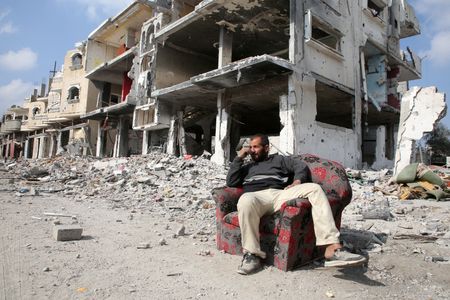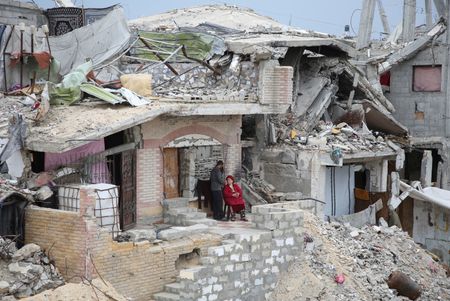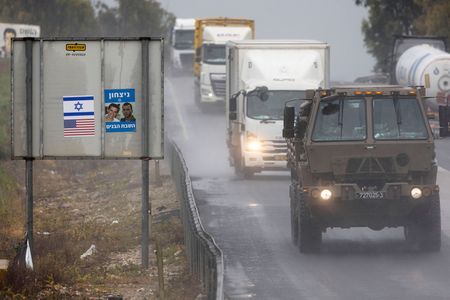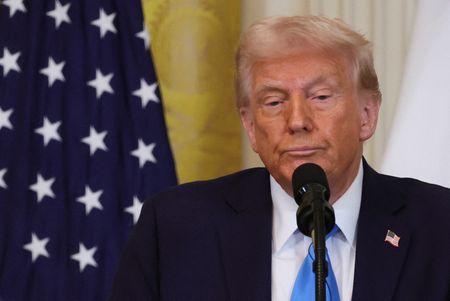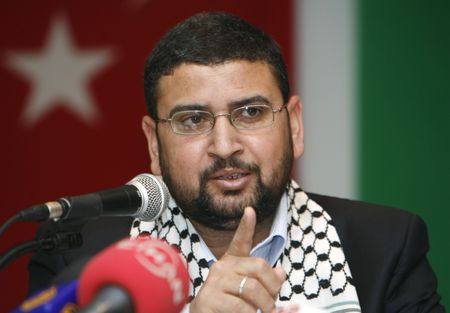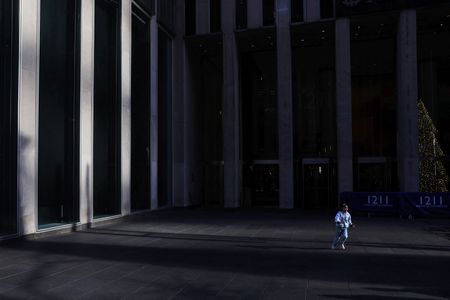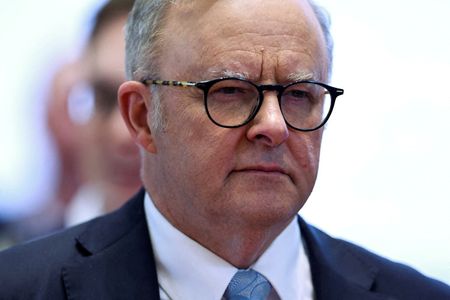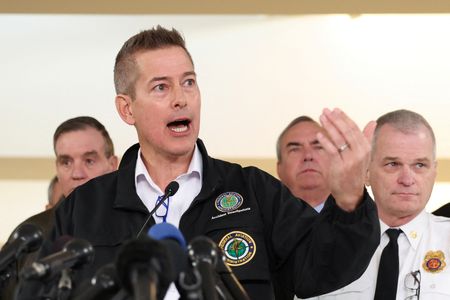By Jeff Mason, Matt Spetalnick, Steve Holland and Nidal al-Mughrabi
WASHINGTON/CAIRO (Reuters) – President Donald Trump’s top aides staunchly defended his push to transfer Palestinians out of Gaza and have the U.S. take over the war-ruined enclave, but they also backed away from elements of his proposal in the face of international condemnation.
A longtime New York property developer, Trump drew rebukes on Wednesday from world powers Russia, China and Germany, which said it would foster “new suffering and new hatred.” Regional heavyweight Saudi Arabia rejected the proposal outright.
Barely two weeks in the job, Trump shattered decades of U.S. policy on Tuesday with a vaguely worded announcement saying he envisioned transforming Gaza into the “Riviera of the Middle East” where international communities could coexist after nearly 16 months of Israeli bombardment devastated the coastal strip and killed more than 47,000 people, according to Palestinian tallies.
At a White House briefing on Wednesday, press secretary Karoline Leavitt hailed his Gaza proposal as historic “outside of the box” thinking but stressed that the president had not committed to putting “boots on the ground” in the territory. She declined, however, to rule out the use of U.S. troops there.
At the same time, Leavitt walked back Trump’s earlier assertion that Gazans needed to be permanently resettled in neighboring countries, saying instead that they should be “temporarily relocated” for the rebuilding process.
U.S. Secretary of State Marco Rubio also said the idea was for Gazans to leave the territory for an “interim” period of reconstruction and debris-clearing.
It was unclear whether Trump would go ahead with his proposal or, in keeping with his self-image as a shrewd dealmaker, was simply laying out an extreme position as a bargaining ploy. His first term was replete with what critics said were over-the-top foreign policy pronouncements, many of which were never implemented.
Trump’s son-in-law and former aide, Jared Kushner, last year described Gaza as valuable waterfront property, and on Tuesday Trump made similar claims as he called for the permanent resettlement of the more than 2 million Palestinians from there.
Some experts said the proposed actions could violate international law. Others described his ideas as unworkable. Human rights advocates said it would amount to “ethnic cleansing.”
“Everybody loves it,” Trump told reporters in the Oval Office earlier on Wednesday, referring to his Gaza idea.
Trump’s proposal, however, appears to run counter to U.S. public opinion, which polls have shown is overwhelmingly opposed to new entanglements in conflict zones following lengthy military interventions in Iraq and Afghanistan.
Trump frequently asserted during the 2024 election campaign and since returning to office that he would end what he called “ridiculous” wars and prevent others from starting.
His Gaza proposal drew broad condemnation from Democratic lawmakers but confusion and skepticism from some fellow Republicans, while others praised the moves as bold.
“I thought we voted for America first,” Republican Senator Rand Paul said on X. “We have no business contemplating yet another occupation to doom our treasure and spill our soldiers blood.”
On a trip to Guatemala, Rubio, apparently seeking to counter the wave of global criticism, insisted Trump’s proposal was not a hostile move but a generous one that expressed “the willingness of the United States to become responsible for the reconstruction of that area.”
In contrast, Leavitt said U.S. taxpayers would not foot the bill and that Trump would strike a deal with regional partners.
Trump offered no specifics as he announced his proposal while welcoming Israeli Prime Minister Benjamin Netanyahu to the White House on Tuesday.
‘TRUMP CAN GO TO HELL’
Netanyahu, who met on Wednesday with U.S. Vice President JD Vance, would not be drawn into discussing the proposal, other than to praise Trump for trying a new approach.
But Leavitt, who described it as “something the president has been socializing and thinking about for quite some time,” said Trump told Netanyahu in advance what he would announce on Tuesday.
Jordan’s King Abdullah, who will meet Trump at the White House next week, said he rejected any moves to annex land and displace Palestinians. Egypt said it would back Gaza recovery plans, following a ceasefire that took effect on Jan. 19, without Palestinians leaving the territory.
In Gaza, Palestinians living among the wreckage of their former homes said they would never accept the idea.
“Trump can go to hell, with his ideas, with his money, and with his beliefs. We are going nowhere. We are not some of his assets,” said Samir Abu Basel, a father of five in Gaza City displaced from his house by the war.
Since taking office on Jan. 20, Trump has talked about a U.S. takeover of Greenland, warned of the possible seizure of the Panama Canal and declared that Canada should become the 51st U.S. state.
Some critics have said his expansionist rhetoric echoes old-style imperialism, suggesting it could encourage Russia in its war in Ukraine and give China justification for invading self-ruled Taiwan.
World leaders said they remained supportive of the two-state solution that has formed the basis of U.S. policy in the region for decades, which has held that Gaza would be part of a future Palestinian state that includes the Israeli-occupied West Bank.
Defense Secretary Pete Hegseth said, before a meeting with Netanyahu, that the Pentagon was “prepared to look at all options” related to Gaza. Experts say a major deployment of U.S. forces would be needed to secure Gaza if Trump implements his proposal.
‘RIDICULOUS AND ABSURD’
An official from the Palestinian militant group Hamas called Trump’s proposal “ridiculous and absurd.” Hamas ruled the Gaza Strip before the war there, which was triggered by its October 7, 2023, cross-border attack on Israel in which 1,200 people were killed and 250 abducted, according to Israeli tallies.
“Any ideas of this kind are capable of igniting the region,” Sami Abu Zuhri told Reuters, saying Hamas remains committed to the ceasefire accord with Israel and negotiating its next phase.
What impact Trump’s proposals have on indirect talks over the second stage of the Gaza ceasefire and hostage-release deal was unclear. Hamas has adamantly insisted it wants to remain in Gaza while Netanyahu has vowed to destroy the group and never allow it to again rule the territory.
Trump’s proposal raises questions about whether Saudi Arabia would be willing to join a renewed U.S.-brokered push for a historic normalisation of relations with Israel.
Saudi Arabia, a pivotal U.S. ally in the Middle East, said it would not establish ties with Israel without the creation of a Palestinian state, contradicting Trump’s claim that Riyadh was not demanding a Palestinian homeland.
Trump would like Saudi Arabia to follow in the footsteps of the United Arab Emirates, a Middle East trade and business hub, and Bahrain, both of which signed the Abraham Accords in 2020 and normalised ties with Israel.
But on Wednesday, the kingdom’s foreign ministry said Saudi Arabia rejected any attempts to remove Palestinians from their land and said Crown Prince Mohammed bin Salman had affirmed this position in “a clear and explicit manner.”
Itamar Ben-Gvir, a far-right Israeli lawmaker and former minister for national security, said “encouraging” Gazans to emigrate was the only correct strategy at the end of the Gaza war and urged Netanyahu to adopt the policy “immediately.”
Gaza residents said after war and bombs had failed to eject them from Gaza that Trump would not succeed in doing so.
During a U.N. committee meeting, United Nations Secretary-General Antonio Guterres told Trump: “In the search for solutions, we must not make the problem worse. It is vital to stay true to the bedrock of international law. It is essential to avoid any form of ‘ethnic cleansing.'”
(Reporting by Matt Spetalnick, Jeff Mason and Steve Holland in Washington and Nidal al-Mughrabi in ; Additional reporting by Simon Lewis in Guatemala City, Michelle Nichols in New York, Patricia Zengerle, Phil Stewart and Idrees Ali in Washington, Colleen Howe, Gleb Stolyarov and Mark Trevelyan; Writing by Michael Georgy and Matt Spetalnick; Editing by Mark Heinrich and Howard Goller)

